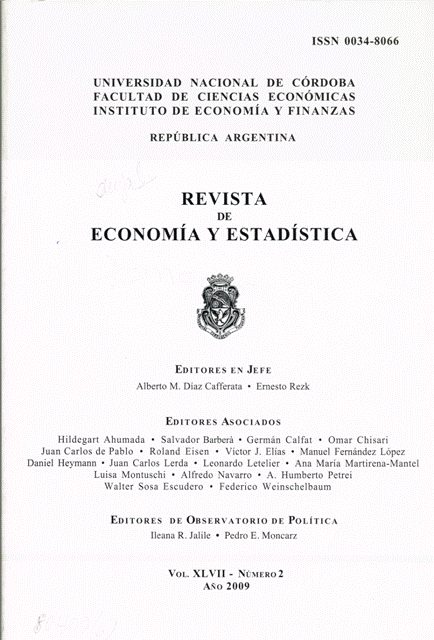Can Public Policy Help to Promote Micro-Enterprises Success in the Context of an Economic Downturn? The Case of Argentina
DOI:
https://doi.org/10.55444/2451.7321.2009.v47.n2.3946Keywords:
micro enterprise, entrepreneur, public policies, ArgentinaAbstract
The paper introduces the question of micro enterprises success in Argentina in the context of the 2007-2008 international financial crisis that overlaps with the lagged effects of the previous domestic downturn of 2001-2002. The work focuses on three aspects of the micro enterprises that have not been sufficiently studied in the literature on emerging economies: entrepreneurial profile of the firm-owner, performance and profile of the micro-entrepreneurs benefited by public policies. Results: according to the entrepreneurial profile four groups were identified, the performance in each group was directly related to entrepreneur’s degree of dedication and inversely related to condition of being previously unemployed and public policies were found to be pro-poor biased.
Downloads
References
Backes-Gellner U. And Moog P. (2008). “Who Chooses to Become an Entrepreneur? The Jacks-off-all Trades in Social and Human Capital”. University of Zurich. Working Paper Nro 76. February.
Benzing Cynthia, Chu Hung Manh, and Kara Orhan (2009). “Entrepreneurs in Turkey: A Factor Analysis of Motivations, Success Factors, and Problems”. Journal of Small BusinessManagement 47(1), pp. 58–91.
Binz H., Reichle M. (2007). “How to Measure the Success Potential and the Degree of Innovation of Technical Ideas and Products”. Frank-Lothar Krause ed. The Future of Product Development. Springer Berlin Heidelberg.
Blanchflower, D. G., A. Oswald y A. Stutzer. (2001). “Latent Entrepreneurship Across Nations”. European Economic Review 45(4-6): 680-691.
BlanchflowerD.G.Ay OswaldA. J. (1998) “Whatmakes an Entrepreneur?” Journal of Labor Economics. 16 (1), pp.26-60
Cranwell, M.R. y Kolodinsky, J. (2002) “The Impact of Microenterprise Development on Low-Income Vermonters Building Social and Human Capital toWork Towards Economic Self-Sufficiency”. Consumer Interests Annual. Volume 48, pp. 1-7.
Cunningham, W. V. y W. F. Maloney. (2001). “Heterogeneity among Mexico´s Micro enterprises: An Application of Factor and Cluster Analysis”. Economic Development and Cultural Change 50: 131-156.
Cunningham, W. V. (2000). “Mexican Female Small Firm Ownership: Motivations, Returns and Gender”. LCSPR World Bank.
Donato V. y Barbero M. I. (2009). Contra Viento y marea. Historias de pequeñas y medianas empresas argentinas. Prometeo Libros – Bononiae Libris. Buenos Aires.
Genescá Garrigosa E. (2004). “Un análisis comparativo de las microempresas en España”. Universia Business Review. Actualidad Económica. Segundo Trimestre.
Kuratko, Donald F; Hornsby, Jeffrey S; Naffziger, Douglas W (1999) “The adverse impact of public policy on microenterprises: An exploratory study of owners’ perceptions. Journal of Developmental Entrepreneurship. April 1.
Lazear E. (2004). “Balanced Skills and Entrepreneurship”. American Economic Review 94: 208-211.
Lichtenstein G.A. and Lyons T. S. (2006), “Business Assets Managing the Community’s Pipeline of Entrepreneurs and Enterprises: A New Way of Thinking About” Economic Development Quarterly; 20; 377.
Matta A. (2008) “Políticas y Programas para la Promoción de la Microempresa en la Argentina y la Provincia de Córdoba”. Documento de Trabajo PICTOR 2004.
Perry, G., W. Maloney, O, Arias, P. Fajnzylber, A. Mason y J. Saavedra Chanduvi (2007). “Informalidad, Escape y Exclusión”. The International Bank for Reconstruction and Development.
Schumpeter, J. A. (1934). The Theory of Economic Development: An Inquiry into Profits, Capital, Credit, Interest, and the Business Cycle. (1949 ed.). Cambridge, MA: Harvard University Press.
Servon L. J. (2006). “Microenterprise Development in the United States: Current Challenges and New Directions”. Economic Development Quarterly; 20; 351
Silva O. (2006). “The Jack-off-all Trades Entrepreuner: Innate Talent or Acquired Skill?”. Institute for the Study of Labor (IZA) Bonn. Discussion Paper 2264. August.
Storey, D.J. (1994). Understanding the small business sector, London: International Thomson Business Press.
Tonge J. (2001). A Review of Small Business Literature Part 2: Birth, Growth and Death of The Small Business. Manchester Metropolitan University Business School Centre for Corporate and Public Affairs. WPS026. November.
Downloads
Published
How to Cite
Issue
Section
License
Copyright (c) 2009 Héctor R. Gertel, Roberto F. Giuliodori, Leandra Bernard, Eugenia Meiners

This work is licensed under a Creative Commons Attribution-NonCommercial-NoDerivatives 4.0 International License.
Authors who have publications with this journal agree to the following terms:
Authors retain their copyright and grant the journal the right of first publication of their work, which is simultaneously subject to the Creative Commons Attribution-NonCommercial-NoDerivatives 4.0 International License that allows third parties to share the work provided that its author and first publication in this journal are indicated.
Authors may adopt other non-exclusive licensing arrangements for distribution of the published version of the work (e.g. depositing it in an institutional telematic archive or publishing it in a monographic volume) as long as the initial publication in this journal is indicated.
Authors are allowed and encouraged to disseminate their work via the Internet (e.g. in institutional telematic archives or on their website) before and during the submission process, which can lead to interesting exchanges and increase citations of the published work. (See The Open Access Effect)









